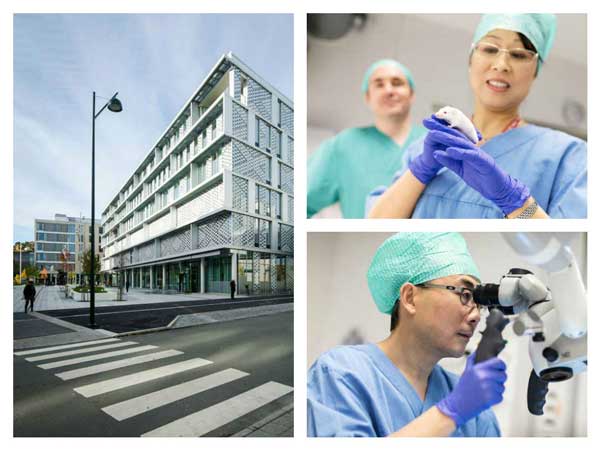Blogger: Bjørn Gustafsson
Dean of Research, The Faculty of Medicine, NTNU
Last week one of our research groups, led by Professor Duan Chen, published a comprehensive scientific study showing promising results in treating gastric cancer, by blocking the tumor nerve supply. The article was published in the prestigious journal Science Translational Medicine.

From left: The Knowledge Center, Chun-Mei Zhao, Gøran T. Andersen (in the background), Duan Chen bottom right (Photo: Helsebygg/Geir Mogen)
The term “translational medicine” involves transferring new knowledge from basic research on for instance cell culture or animal models to practical use in patient care; also coined with the term “from bench-to-bedside”.
New knowledge from basic research and animal studies are of no value if it cannot be tested in clinical trials, which means the patients. Knowledge is also transferred the other way around, experiences from patient care is used to improve the basic research in the laboratory “from bench-to-bedside, and back again”. Good research questions from those who work with patient care are essential for the research conducted in the laboratories to be relevant. This interaction is key for progress in modern medical research.
From exciting results are shown in basic research, it often takes up to 15 years before it reaches patients. In addition, only a fraction of the findings in the laboratory will be put into clinical use. The fact that a treatment is effective in cell experiments or in an animal model that uses genetically identical mice is not a guarantee that it will be effective in the treatment of patients with large individual differences.
Extensive testing is also necessary to be sure that the treatment is safe before it can be used in patient care. For translational research to not be too time-consuming the interaction between researchers and clinicians should be close. Our new St. Olav’s Hospital is built as an integrated hospital, which means the University’s research laboratories are located in the same buildings as where patient care takes place. Researchers and health professionals work side by side. The integration of university and hospitals at Campus Øya provides optimum conditions for efficient translational research where new discoveries can quickly be tested and hopefully provide the patients with new and improved diagnostics or treatment.
The research conducted by Duan Chen’s group is based on collaboration with renowned international research groups from Columbia University, MIT, German and Japanese researchers as well as colleagues at St Olav’s Hospital. In an impressive series of advanced experiments they have been able to show that the development of stomach cancer is dependent on the tumor getting nerve impulses. To ensure that this is really true, experiments have been conducted in three separate mouse models where the nerve supply has been broken with surgery, drugs, or Botox® injections. All three models gave the same answer: if you remove the nerve supply it inhibits cancer development. They also found that cancer generally does not occur in patients in parts of the stomach where the nerve supply has been previously cut with so-called vagotomy. When further examining tumors from patients who had undergone surgery due to cancer in the stomach, they found activated nerve signaling and that the most malignant tumors were those with the most pronounced nerve supply.
At St Olav Hospital we have extensive experience of using Botox® injections in patients with a condition with muscular spasm in the esophagus, called achalasia. The treatment is safe, easily performed during gastroscopy, and takes no more than 10 minutes.
Now Duan Chen in collaboration with doctors at St Olav’s Hospital is launching a Botox® study on patients with gastric cancer. If the treatment proves effective, other types of cancer will also be studied. This is a brilliant example of good translational research in the integrated university hospital.
This study was supported by grants from the Liaison Committee between the Central Norway Regional Health Authority and NTNU (Samarbeidsorganet), The Norwegian Research Council and National Institute of Health (US).

